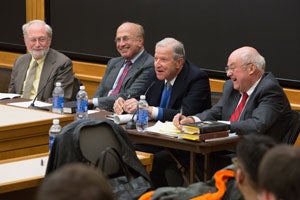A panel of distinguished judges and scholars gathered at Harvard Law School with author David Dorsen ’59 on Nov. 14 to discuss and celebrate his recent biography, “Henry Friendly: Greatest Judge of His Era.”
At the event, moderated by Professor Carol Steiker ’86—who is the Henry J. Friendly Professor of Law at HLS—Judges Michael Boudin ’64, Pierre Leval ’63, Jon Newman, and Richard Posner ’62, together with HLS Professors Todd Rakoff ’75 and Dan Coquillette ’71, joined Dorsen to share personal memories of Friendly and to discuss his accomplishments and legacy.
Dorsen said that writing the book was a “trial and error” process that involved reading every opinion, article and comment Friendly ever wrote, in addition to voting memos, briefs and other correspondence.
The introduction to the book was written by Posner, who is a judge on the Court of Appeals for the Seventh Circuit and a senior lecturer at the University of Chicago Law School. Posner said he is typically wary of judicial biographies because they are often written so long after the subject’s death that they lack personal recollections. But Dorsen, he said, was able to talk to people who knew Friendly, painting a “vivid picture” of his personality and conveying little-known details about the man, including both his depression and his “freewheeling character.”
“We all knew that Friendly was extraordinarily intelligent and such a great judge, but the biography conveys the fact that he was really a genius,” said Posner.
Newman said the book was one of the saddest he had read, in part due to its description of Friendly’s estranged relationship with two of his three children. “This is an absolutely brilliant mind, one of the great contributors to our law, but an incomplete human being,” Newman said.
Friendly, born in 1903, graduated summa cum laude from Harvard College in 1923. He received his J.D. in 1927 from Harvard Law School, also summa cum laude, with the highest numerical average earned in the 20th century. He worked in private practice for three decades until he was appointed to the Court of Appeals for the Second Circuit in 1959. He died in 1986.
Given the backdrop of Harvard Law School at the time, Friendly’s academic success was “simply unbelievable,” said Coquillette, the Warren Visiting Professor of American Legal History. In the 1920s, Harvard Law School had a high student-faculty ratio, Coquillette said, and was in rough shape both financially and physically. The school failed over one-third of all first-year students, resulting in a stressful environment. On top of that, Friendly identified as Jewish at a time when the school had a quota on Jewish students.
Friendly’s extraordinary intelligence carried over into his time on the bench. After reading the briefs and appendices in a case, Leval said, Friendly would begin writing, as quickly as he would if he were copying a text. When he wanted a citation or quotation, he could simply pluck the exact volume he needed off the shelf, Leval said.
“Judge Friendly had all of law in his head, with an extraordinary understanding of the interrelationships between all the different doctrines” said Leval, a judge on the Court of Appeals for the Second Circuit, who clerked for Friendly for a year.
His genius, however, made him a tough supervisor, Leval said, unwilling to accept the work product of those less intelligent than he was.
“His basic idea was that you were there to work,” said Rakoff, another former Friendly clerk. “And his basic proposition was, show me you’re good.” According to Boudin, though, Friendly’s harsh manner simply reflected the “uncongratulatory” style of the period.
Still, both Rakoff and Leval said Friendly’s exacting standards were counterbalanced by the way he welcomed disagreement. If a clerk’s work was better than his, Friendly did not hesitate to scrap his own product, Rakoff said. On one occasion, Leval said, he disagreed with Friendly’s interpretation of two cases in a footnote. Trembling, he brought it up with the judge. To his surprise, the judge lit up, delighted to get disagreement from a clerk.
Despite Friendly’s work, it has been argued that he is fading into obscurity, Steiker said, and she asked the panel why that might be. According to Posner, Friendly had a dense writing style that has made him less quotable than other judges. But Friendly purposely eschewed pithy aphorism as a way to make his conclusions seem more compelling than they were, Leval argued.
“Judge Friendly always treated the issue in all of its full complexity and with an extremely incisive understanding of all of those complexities,” he said.
Or perhaps Friendly’s legacy has weakened because of his judicial methodology, Rakoff suggested. He did not fall into any theoretical camp and made his interpretive choices in context, Rakoff argued. But to some extent, academia now values a “monotextured” theoretical philosophy and Friendly does not fit this mold.
The panelists disagreed over the motivations behind Friendly’s judicial flexibility.
“To reach the result he needed to mold the law, he would pick and choose among the various approaches that would let him do that,” argued Dorsen.
By contrast, Leval said Friendly’s underlying philosophy held that different legal situations fundamentally required different legal approaches. Not all statutes, for example, should be interpreted in the same way. And in Posner’s view, Friendly simply did what all experienced judges should do.
“You see a case and you see there’s a sensible outcome,” Posner said. “The question is, can you reach that outcome without inflicting too much collateral damage, and usually you can.”
“Henry Friendly: Greatest Judge of His Era” was published in March by Harvard University Press.
